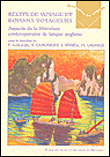
Récits de voyage et romans voyageurs
Presses Universitaires de Provence
2006
Gallix François, Vanessa Guignery, Jean Viviès et Matthew
Graves, eds.. Récits de voyage et romans voyageurs. Aspects
de la littérature contemporaine de langue anglaise. Aix-en-Provence:
Presses Universitaires de Provence / collection "écritures
du voyage", 2006.
Table of contents
Préludes
Le renouveau du récit de voyage : du New Journalism au New Travel
Writing, par Matthew GRAVES
Voyage au coeur du voyage : The Art of Travel (2002) d'Alain
de Botton, par Vanessa GUIGNERY
Étapes fondatrices de l'hybridité
Bitter Lemons (1957) de Lawrence Durrell : le patchwork et le
palimpseste, par Françoise DUPEYRON-LAFAY
The Songlines de Bruce Chatwin : du voyage philosophique à
l'ethnologie poétique, par Jan BORM
Chemins de traverse
Sur les pas de John Rebus à Edimbourg : pérégrinations
symboliques dans l'oeuvre de Ian Rankin, par Arnaud SCHMITT
Récits de voyage, révolutions scientifiques et mutations
lexicales, par Jean-Louis VIDALENC
Le chant de marins au sein de quelques récits de voyage et romans
voyageurs contemporains de langue anglaise, par Marlène JUNIUS
Variations génériques récentes
Stratégies de l'errance : le voyage baroque dans Nights at
the Circus d'Angela Carter, par Christian GUTLEBEN
Stranger on a Train de Jenny Diski entre récit de voyage
et roman, par Nicole TERRIEN
The Saddest Pleasure, A memoir by Moritz Thomsen : travel narrative
as ego trip, par Michèle HITA
L'écriture du voyage dans The Enigma of Arrival et Half
a Life de V.S. Naipaul, par Florence LABAUNE-DEMEULE
Fluctuations génériques et mystifications en tous genres
: l'étonnant périple de Star of the Sea de Joseph O'Connor,
par Catherine MARI
En route vers la Tasmanie
Inventer le voyage dans une langue d'emprunt : histoires de quête
et d'exil dans English Passengers de Matthew Kneale, par Catherine
PESSO-MIQUEL
English Passengers ou les raisons qui amènent un romancier
anglais à écrire sur la cruauté de l'Empire britannique,
par Matthew KNEALE
*
This volume aims to investigate the discourse
of travel in contemporary English language narratives and novels (in
Great Britain and countries of the Commonwealth). Rather than treat
the travel book in generic isolation, we feel it worthwhile to explore
the porosity of the genre and the interaction between travel narratives
and novels involving journeys, which we shall label for convenience’s
sake “travel novels”.
In 1977, when Bruce Chatwin published his landmark
travel book In Patagonia, he revived a genre that had lost much
of its lustre since the golden age of 1930s travel literature (Peter
Fleming, Robert Byron, Evelyn Waugh, Graham Greene) by injecting it
with a generous dose of fiction: an experiment that he would take to
its logical conclusion a decade later with his hybrid novel-cum-travelogue,
The Songlines. It is significant in this regard that Chatwin
should persistently reject the label of travel writer in preference
to that of novelist. A succession of dedicated travel writers were to
follow in Chatwin’s creative footsteps: in the 1980s, Redmond O’Hanlon,
Paul Theroux, Jonathan Raban, Patrick Leigh-Fermor and Colin Thubron;
and into the 1990s, William Dalrymple, Jason Elliot and Simon Winchester.
Thus it appears that the renaissance of the travel book derives from
the blurring of generic and ontological contours, as well as a sustained
challenge to the travel narrative’s purely referential status.
At the same time, a number of contemporary novelists
such as Salman Rushdie, Graham Swift, Julian Barnes or Michael Ondaatje
began to work the discourse of travel, nomadism and exile into their
novels, juggling with generic frontiers and conventions in a broader
trend towards the re-enchantment of literature and its codes. More recently,
the novelist Alain de Botton has shown how travel has been inscribed
in literature through his own hybrid work, The Art of Travel (2002).
These travel novels, which are notable for their keen sense of space,
tackle through fictional devices issues that are more routinely developed
in travel narratives: journeys, migrations, discovery of unknown lands,
wanderlust….
The field of enquiry of our conference will therefore
revolve around the notions of travel writing, the intermingling of novel
and travel narrative and the overlapping of the fictional and the referential
domains. We shall examine contemporary English language works drawn
from the dual spheres of travel writing and the novel, displaying the
multiple forms of travel discourse. We also propose to include reworkings
of past travel narratives, the better to reveal the historic background
of the genre and the original contributions of contemporary writers.